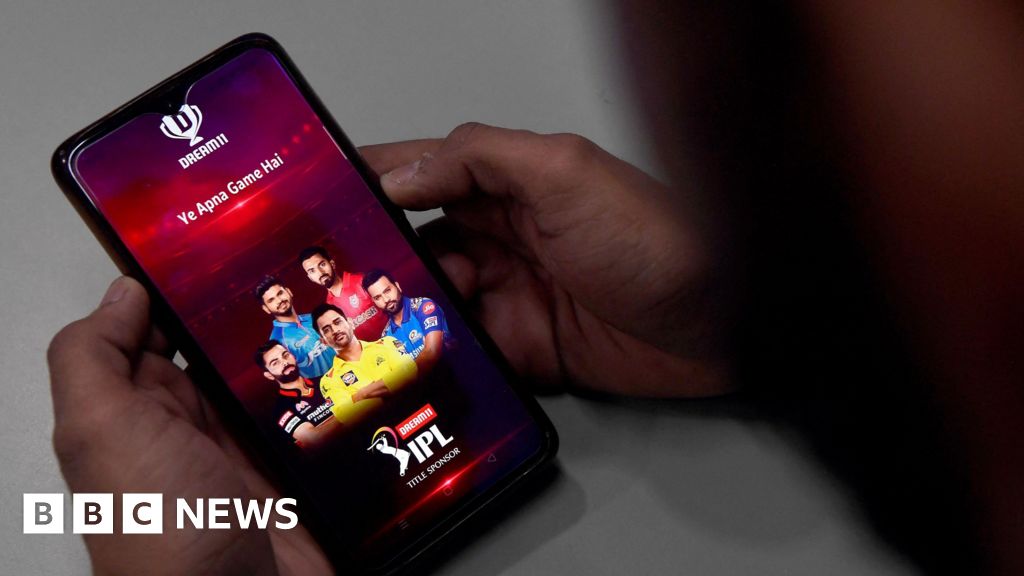Kartik Srinivas (name changed) still flinches at the mention of online betting. What began as a thrill to earn a quick buck spiralled into a five-year addiction that cost the 26-year-old his savings, peace of mind and nearly his future.
Between 2019 and 2024, Srinivas lost more than 1.5m rupees ($17,000; £13,000). The money included three years of his earnings, as well as savings and loans from friends and family.
I tried everything - apps, local bookies, international platforms. I was hooked, he says.
By 2024, he was neck-deep in losses.
Srinivas' story reflects the darker side of India's once booming Real Money Games (RMG) industry - where players use online platforms to bet cash on poker, fantasy sports and other games.
Days ago, India passed a bill to outlaw these games, arguing they had become increasingly addictive and were leading to financial distress among people.
The new law makes offering or enabling such services punishable, with a jail term of up to three years and a fine of up to 10m rupees. Promoting them carries penalties of two years and 5m rupees, though users are treated as victims, not offenders.
The government has defended the move as a way to protect consumers from gambling.
Federal IT Minister Ashwini Vaishnaw said online money games had harmed 450 million Indians, causing losses of over 200bn rupees and triggering depression and suicides among many.
But many in the industry have called the ban a knee-jerk move, which they say has crippled a thriving sector and would hurt those it is trying to protect.
Before the ban, India had around 400 RMG startups that generated nearly $2.3bn in annual taxes and supported more than 200,000 jobs. One of them, Dream11, even sponsored India's cricket team.
This is the first federal law to ban online betting platforms, though the sector has long faced scrutiny.
Mumbai-based gaming lawyer Jay Sayta told the BBC that the ban was a massive setback for investors who had pumped in millions of dollars into these startups.
He said that while there was a need for some regulation in the industry, the law was introduced in haste and without consultation. Among the hardest hit are Dream11 and My11Circle, both of which have shut real-money gaming operations.
One of the key contentions of the industry is that the law does not distinguish between games of skill and games of chance. Several Indian high courts have in past rulings classified online money games under the skill category and have struck down state-level bans on gaming platforms.
Smrita Singh Chandra, a former policy manager at Dream11, criticized the blanket ban for lacking consideration of economic realities.
Indian gaming federations argue that the shutdown will drive players to illegal networks and unregulated platforms, which may prove more exploitative.
As the debate continues, experts and users alike express the need for more awareness around gambling harms instead of outright bans.
Between 2019 and 2024, Srinivas lost more than 1.5m rupees ($17,000; £13,000). The money included three years of his earnings, as well as savings and loans from friends and family.
I tried everything - apps, local bookies, international platforms. I was hooked, he says.
By 2024, he was neck-deep in losses.
Srinivas' story reflects the darker side of India's once booming Real Money Games (RMG) industry - where players use online platforms to bet cash on poker, fantasy sports and other games.
Days ago, India passed a bill to outlaw these games, arguing they had become increasingly addictive and were leading to financial distress among people.
The new law makes offering or enabling such services punishable, with a jail term of up to three years and a fine of up to 10m rupees. Promoting them carries penalties of two years and 5m rupees, though users are treated as victims, not offenders.
The government has defended the move as a way to protect consumers from gambling.
Federal IT Minister Ashwini Vaishnaw said online money games had harmed 450 million Indians, causing losses of over 200bn rupees and triggering depression and suicides among many.
But many in the industry have called the ban a knee-jerk move, which they say has crippled a thriving sector and would hurt those it is trying to protect.
Before the ban, India had around 400 RMG startups that generated nearly $2.3bn in annual taxes and supported more than 200,000 jobs. One of them, Dream11, even sponsored India's cricket team.
This is the first federal law to ban online betting platforms, though the sector has long faced scrutiny.
Mumbai-based gaming lawyer Jay Sayta told the BBC that the ban was a massive setback for investors who had pumped in millions of dollars into these startups.
He said that while there was a need for some regulation in the industry, the law was introduced in haste and without consultation. Among the hardest hit are Dream11 and My11Circle, both of which have shut real-money gaming operations.
One of the key contentions of the industry is that the law does not distinguish between games of skill and games of chance. Several Indian high courts have in past rulings classified online money games under the skill category and have struck down state-level bans on gaming platforms.
Smrita Singh Chandra, a former policy manager at Dream11, criticized the blanket ban for lacking consideration of economic realities.
Indian gaming federations argue that the shutdown will drive players to illegal networks and unregulated platforms, which may prove more exploitative.
As the debate continues, experts and users alike express the need for more awareness around gambling harms instead of outright bans.





















